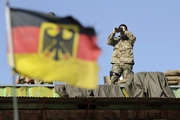 I am in the north of Afghanistan today, visiting the German troops stationed here. Their camp is the most immaculate headquarters I have seen in this dust-covered country. The German office in charge of ISAF’s northern flank, Brigadier Jurg Volmer is focused and knowledgeable. He is keen to impress upon his visitors how much his troops are doing and how their work has made his area of responsibility stable. Militarily, his troops run almost half of all ISAF air operations and guard ISAF’s northern supply route.
I am in the north of Afghanistan today, visiting the German troops stationed here. Their camp is the most immaculate headquarters I have seen in this dust-covered country. The German office in charge of ISAF’s northern flank, Brigadier Jurg Volmer is focused and knowledgeable. He is keen to impress upon his visitors how much his troops are doing and how their work has made his area of responsibility stable. Militarily, his troops run almost half of all ISAF air operations and guard ISAF’s northern supply route.
But it is hard not to doubt Volmer’s claims. His 5,000 troops cover an area half the size of Germany. Out of these, only about 1,500 soldiers actually leave the headquarters. When they do, they are hampered by many so-called “caveats” – restrictions on their operations imposed by Berlin. As I tried to get back to Kabul the military flight was turned around in mid-air because the crew were not sure they could make the journey back to Mazar-i-Sharif from Kabul that day, a German requirement. It was 3.15 in the afternoon and the flight only takes an hour!
The few civilians stationed in the north—the UN, EU and USAID– work hard and coordinate their activities but freely admitted they did not have an overview of all donor projects or a senior figure who can make sure they all work to a strategic plan.
So what to do? I have long argued that many European governments are not doing enough to back the ISAF mission and repeat this in a new report (which audits all their contributions). But I am equally convinced that moving the Germans (and the Croats, Swedes, Hungarians and Finns) south or east would be a really bad idea; they are ill-equipped for counter-insurgency and would probably get themselves killed in large numbers of become sitting ducks. None of this would be good for NATO or the ISAF mission.
I would recommend two concrete ideas and one process idea. The process first. As Britain has a Helmand Road Map to guide its civil-military work in the south, Regional Command North needs to develop a comprehensive political-military strategy. In thinking through their options, the Germans should consider two options. The first one, suggested by my fellow-traveller and CFR Fellow George Gavrilis, is to turn RC North into border mission. The 1,500 troops do not guarantee security, but could make a real impact on the smuggling operations along the border. Keep a small contingent in Mazar-i-Sharif to operate the airbase, but create several border posts where ISAF can prepare the Afghan National Army to take-over border patrolling from the corrupt Border Police.
The second one is to turn the whole of RC North into one big civilian operation led by a senior diplomat. Some troops could be sent home and others transferred to RC Central to protect Kabul and surrounding provinces, with the funds freed-up from this used on development projects.






Comments